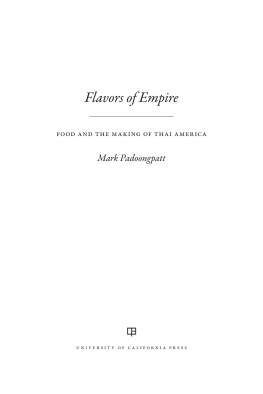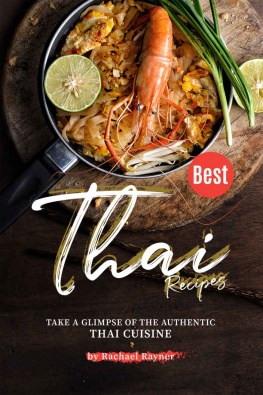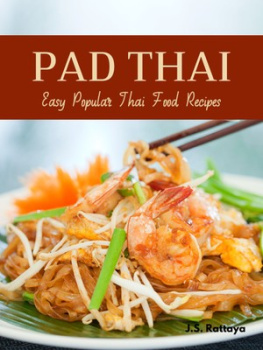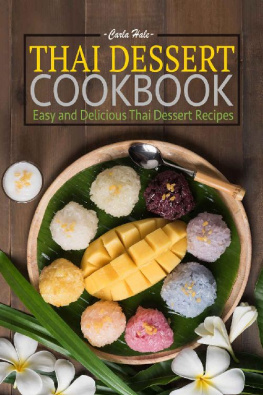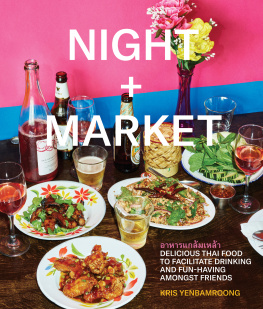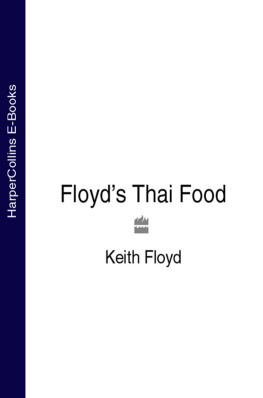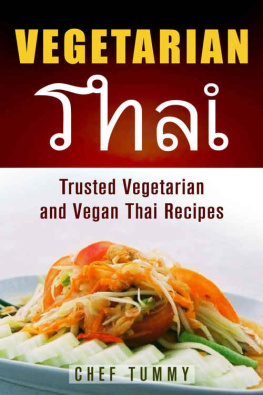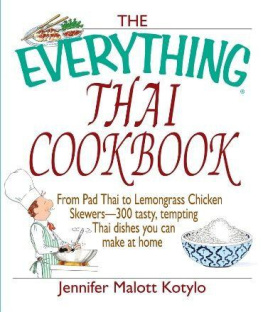Flavors of Empire
Edited by Earl Lewis, George Lipsitz, George Snchez,
Dana Takagi, Laura Briggs, and Nikhil Pal Singh
Flavors of Empire

FOOD AND THE MAKING OF THAI AMERICA
Mark Padoongpatt

UNIVERSITY OF CALIFORNIA PRESS
University of California Press, one of the most distinguished university presses in the United States, enriches lives around the world by advancing scholarship in the humanities, social sciences, and natural sciences. Its activities are supported by the UC Press Foundation and by philanthropic contributions from individuals and institutions. For more information, visit www.ucpress.edu.
University of California Press
Oakland, California
2017 by Mark Padoongpatt
Library of Congress Cataloging-in-Publication Data
Names: Padoongpatt, Mark, author.
Title: Flavors of empire : food and the making of Thai America / Mark Padoongpatt.
Description: Oakland, California : University of California Press, [2017] | Series: American crossroads | Includes bibliographical references and index. |
Identifiers: LCCN 2017016679 (print) | LCCN 2017019088 (ebook) | ISBN 9780520966925 (ebook) | ISBN 9780520293731 (cloth : alk. paper) | ISBN 9780520293748 (pbk. : alk. paper)
Subjects: LCSH : ThaisCaliforniaLos AngelesSocial conditions. | Cooking, Thai. | ThaisCaliforniaLos AngelesSocial life and customs.
Classification: LCC E184.T4 (ebook) | LCC E184.T4 P33 2017 (print) | DDC 641.59593dc23
LC record available at https://lccn.loc.gov/2017016679
Manufactured in the United States of America
26 25 24 23 22 21 20 19 18 17
10 9 8 7 6 5 4 3 2 1
For my parents, Nuttita and Vitaya
For all Robin Hoods, past and present
For Thai America
CONTENTS
ILLUSTRATIONS
FIGURES
MAPS
ACKNOWLEDGMENTS
It is quite remarkable to think about all of the peopleactivists, colleagues, friends, family, and people I barely even knewwho had a hand in helping this book come into being. I owe an incredible debt to Chancee Martorell and the Thai Community Development Center, who enthusiastically supported my research and gave me full access to every document they had on Thai Town. Chancee, who has been the bedrock and heart of the Thai community in Los Angeles for over twenty years, taught me about the issues confronting Thai Americans and the efforts to address them when I volunteered at the Thai CDC as a graduate student. I am equally indebted to Wat Thai of Los Angeles, especially the volunteers and monks who handed me materials about the temples history. Thanks also to the Royal Thai Consulate Los Angeles for lending me rare books. A very special thanks to Barbara Hansen, Wandee Pathomrit, Urai Ruenprom, Jet Tilakamonkul, and Prakas Yenbamroong for sharing their stories with me along with photos, newspaper clippings, memoirs, and research leads. I am proud to be in community with you all.
Flavor of Empire began when I was an undergraduate at the University of Oregon. Matt Garcia is responsible for its inception. He told me during an office hours meeting in my sophomore year that I needed to write a history of Thai Americans. I agreed. In addition to Matt, who remains a constant source of support and mentorship, Nerissa Balce, Arif Dirlik, Adria Imada, Fiona I. B. Ngo, Peggy Pascoe, Mario Sifuentez, and Martin Summers helped develop my ideas and molded me into a graduate student. Mario is a major reason why I am a professor. His mentorship, friendship, and love over the years have helped me and this project blossom. For that, I am forever indebted to him. I also owe an insurmountable debt to Fiona for working tirelessly with me to get the project off the ground. I would not be the scholar I am today had Peggy not taken me under her wing. I miss her dearly and think about her often.
The Department of American Studies and Ethnicity at the University of Southern California was a vibrant intellectual space where I was surrounded by brilliant and generous souls. Lon Kurashige was a fantastic dissertation chair. He read drafts carefully and provided feedback both small and large, none larger than pushing me to think deeper about the significance of Thai Americans to Asian American history. Thank you to Bill Deverell, whose genius and love of history have been a source of inspiration from the very first day I walked into his Los Angeles history course. Robin D. G. Kelleys imprints are all over this book. His scholarship, teaching, and activism have had the greatest influence on my thinking and approach to history. At USC, Robin was enthusiastic about my writing on the cultural politics of Thai food from the beginning (even in its early, incoherent stages) and was extremely generous with his time, energy, and knowledge. He is a model of the type of scholar I could only ever hope to be. George J. Sanchez provided invaluable insights, suggestions, and tough criticism. Above all, he recognized the potential and broader implications of this project and never allowed me to settle for filling a gap in existing scholarship. George continues to mentor me, a practice I am no doubt paying forward.
Ruthie Wilson Gilmore, Sarah Gualtieri, Jane Iwamura, Lanita Jacobs, Dorinne Kondo, Nancy Lutkehaus, Fred Moten, Viet Nguyen, Laura Pulido, David Roman, Leland Saito, Karen Tongson, and Janelle Wong were exemplary activist scholars. My cohortChrisshonna Grant-Nieva, Todd Honma, Abigail Rosas, Gretel Vera Rosas, Margaret Salazar-Porzio, and Terrion Williamsoncarried me through the program. Many thanks to Adam Bush, Genevieve Carpio, Jolie Chea, Michan Connor, Robert Eap, Laura Fugikawa, Perla Guerrero, Kai Green, Christina Heatherton, Emily Hobson, Imani Kai Johnson, Priscilla Leiva, Sharon Luk, Celeste Menchaca, Phuong Nguyen, Anthony Bayani Rodriguez, and David Stein. My sincerest appreciation goes to Laura Barraclough, Wendy Cheng, Dan HoSang, and Laura Pulido for seeing the importance of the Thai American experience in Los Angeles. I also am thankful for Hillary Jenks, who provided much needed support at different times throughout the project. Thanks also to Alex Avina, Gilbert Estrada, Glenda Flores, Jerry Gonzalez, Rosina Lozano, Julia Ornelas-Higdon, Yuko Konno, and Go Oyagi. Equally important were Sandra Hopwood, Kitty Lai, Jujuana Preston, and Sonia Rodriguez for taking a bit of stress out of grad school.
The University of Nevada, Las Vegas has also provided a wonderful community of scholars who have been integral to the completion of the book. I cherish my colleagues in the Department of Interdisciplinary, Gender, and Ethnic StudiesConstancio Arnaldo, Erika Abad, Sheila Bock, Lynn Comella, Kendra Gage, Tim Gauthier, Joan Mann, Brandon Manning, Anita Revilla, Danielle Roth-Johnson, and Rainier Spencerfor cultivating a space that values excellence in research. I am grateful to have Anita Revilla in my life as a mentor and friend. Brandon Manning became one of my best friends immediately upon his arriving at UNLV. As a result, he experienced nearly every growing pain and milestone of this book. I appreciate him for being there through the good and not so good times. Thank you to Michael Alarid, Willy Bauer, Jiemin Bao, Raquel Casas, Maile Chapman, Xuan Carlos Espinoza-Cuellar, Georgiann Davis, Bob Futrell, Andy Fry, Marcia Gallo, Peter Gray, Greg Hise, Tiffiany Howard, Ranita Ray, Todd Robinson, Meo Santillana, Jeff Schauer, David Tanenhaus, A. B. Wilkinson, Doris Watson, and Tessa Winkelmann. Willy and Raquel deserve great appreciation for guiding me through my first years at UNLV and continuing to be part of my support system. Much love to A. B. for hashing out ideas with me, offering comments, and being a good friend. Last but not least, I thank Desir Galvez as well as my interdisciplinary studies students for taking a vested interest in the project. It mattered.
Next page
